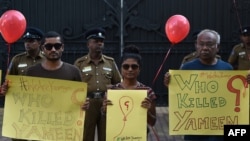More than 30 Western countries called on Maldives at the U.N. Human Rights Council on Wednesday to thoroughly investigate the death of a prominent blogger and to guarantee space for activists and political opposition.
Yameen Rasheed, who denounced Islamist extremism and state corruption, was found stabbed to death in late April. He had led a campaign to find a journalist presumed abducted in 2014 and had repeatedly complained to police about death threats.
The Maldives government denies targeting any critic unfairly and President Abdulla Yameen has condemned Rasheed's murder, vowing to bring the perpetrators to justice.
But Britain, in a joint statement read out on behalf of countries including the United States, said strong guarantees in the Maldives constitution of freedom of expression were being "increasingly curtailed."
"We welcome the government's commitment to ensuring an objective and impartial investigation into the killing of blogger and prominent human rights defender, Yameen Rasheed," Britain's ambassador Julian Braithwaite said in the statement, noting that Rasheed's father, Hussain, attended the session.
The joint statement urged the government to "prevent the intimidation of human rights defenders," including by those who promote violent extremism.
"Legitimate opposition remains a vital component of a healthy democracy, and it is essential that the freedoms of assembly and expression are granted to all."
Forum-Asia, a non-governmental organization which promotes human rights and development, welcomed the "unprecedented censure" at the council, adding that "the government is yet to hold a credible investigation" into Rasheed's murder.
Maldives Ambassador Hala Hameed told the council her government had shown "our willingness to engage in constructive dialogue across the breadth of human rights issues, engaging with human rights institutions and robust press and civil society to maintain our strong record of protecting core political rights."
The tropical Indian Ocean archipelago of 400,000 people has been mired in political instability since its uneasy shift to democracy in 2008, and critics accuse President Yameen of autocratic behavior.
Many potential challengers in elections due in 2018 have been arrested for alleged security offenses.
"The use of the judicial system to target political opponents is a serious threat to the prospect of credible and inclusive elections in 2018," the European Union said Wednesday.





